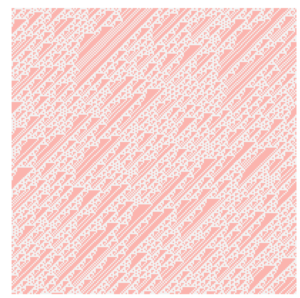In my previous note, I looked at an amusing but inefficient way to compute the sum $$ \sum_{n \geq 1} \frac{\varphi(n)}{2^n - 1}$$ using Mellin and inverse Mellin transforms. This was great fun, but the amount of work required was more intense than the more straightforward approach offered immediately by using Lambert series.
However, Adam Harper suggested that there is a nice shortcut that we can use (although coming up with this shortcut requires either a lot of familiarity with Mellin transforms or knowledge of the answer).
In the Lambert series approach, one shows quickly that $$ \sum_{n \geq 1} \frac{\varphi(n)}{2^n - 1} = \sum_{n \geq 1} \frac{n}{2^n},$$ and then evaluates this last sum directly. For the Mellin transform approach, we might ask: do the two functions $$ f(x) = \sum_{n \geq 1} \frac{\varphi(n)}{2^{nx} - 1}$$ and $$ g(x) = \sum_{n \geq 1} \frac{n}{2^{nx}}$$ have the same Mellin transforms? From the previous note, we know that they have the same values at $1$.
We also showed very quickly that $$ \mathcal{M} [f] = \frac{1}{(\log 2)^2} \Gamma(s) \zeta(s-1). $$ The more difficult parts from the previous note arose in the evaluation of the inverse Mellin transform at $x=1$.
Let us compute the Mellin transform of $g$. We find that $$ \begin{align} \mathcal{M}[g] &= \sum_{n \geq 1} n \int_0^\infty \frac{1}{2^{nx}} x^s \frac{dx}{x} \notag \\ &= \sum_{n \geq 1} n \int_0^\infty \frac{1}{e^{nx \log 2}} x^s \frac{dx}{x} \notag \\ &= \sum_{n \geq 1} \frac{n}{(n \log 2)^s} \int_0^\infty x^s e^{-x} \frac{dx}{x} \notag \\ &= \frac{1}{(\log 2)^2} \zeta(s-1)\Gamma(s). \notag \end{align}$$ To go from the second line to the third line, we did the change of variables $x \mapsto x/(n \log 2)$, yielding an integral which is precisely the definition of the Gamma function.
Thus we see that $$ \mathcal{M}[g] = \frac{1}{(\log 2)^s} \Gamma(s) \zeta(s-1) = \mathcal{M}[f],$$ and thus $f(x) = g(x)$. ("Nice" functions with the same "nice" Mellin transforms are also the same, exactly as with Fourier transforms).
This shows that not only is $$ \sum_{n \geq 1} \frac{\varphi(n)}{2^n - 1} = \sum_{n \geq 1} \frac{n}{2^n},$$ but in fact $$ \sum_{n \geq 1} \frac{\varphi(n)}{2^{nx} - 1} = \sum_{n \geq 1} \frac{n}{2^{nx}}$$ for all $x > 1$.

Info on how to comment
To make a comment, please send an email using the button below. Your email address won't be shared (unless you include it in the body of your comment). If you don't want your real name to be used next to your comment, please specify the name you would like to use. If you want your name to link to a particular url, include that as well.
bold, italics, and plain text are allowed in comments. A reasonable subset of markdown is supported, including lists, links, and fenced code blocks. In addition, math can be formatted using
$(inline math)$or$$(your display equation)$$.Please use plaintext email when commenting. See Plaintext Email and Comments on this site for more. Note also that comments are expected to be open, considerate, and respectful.